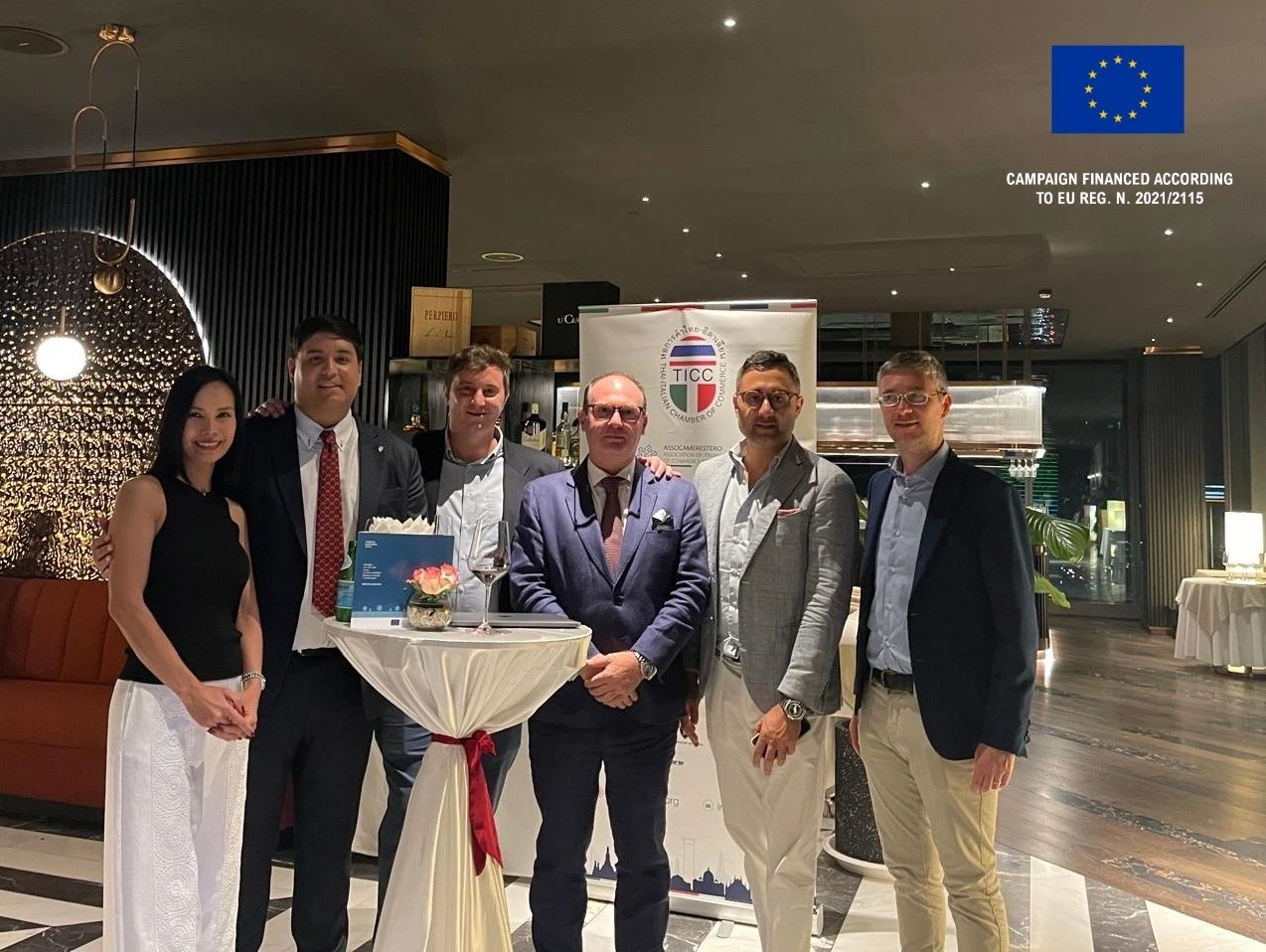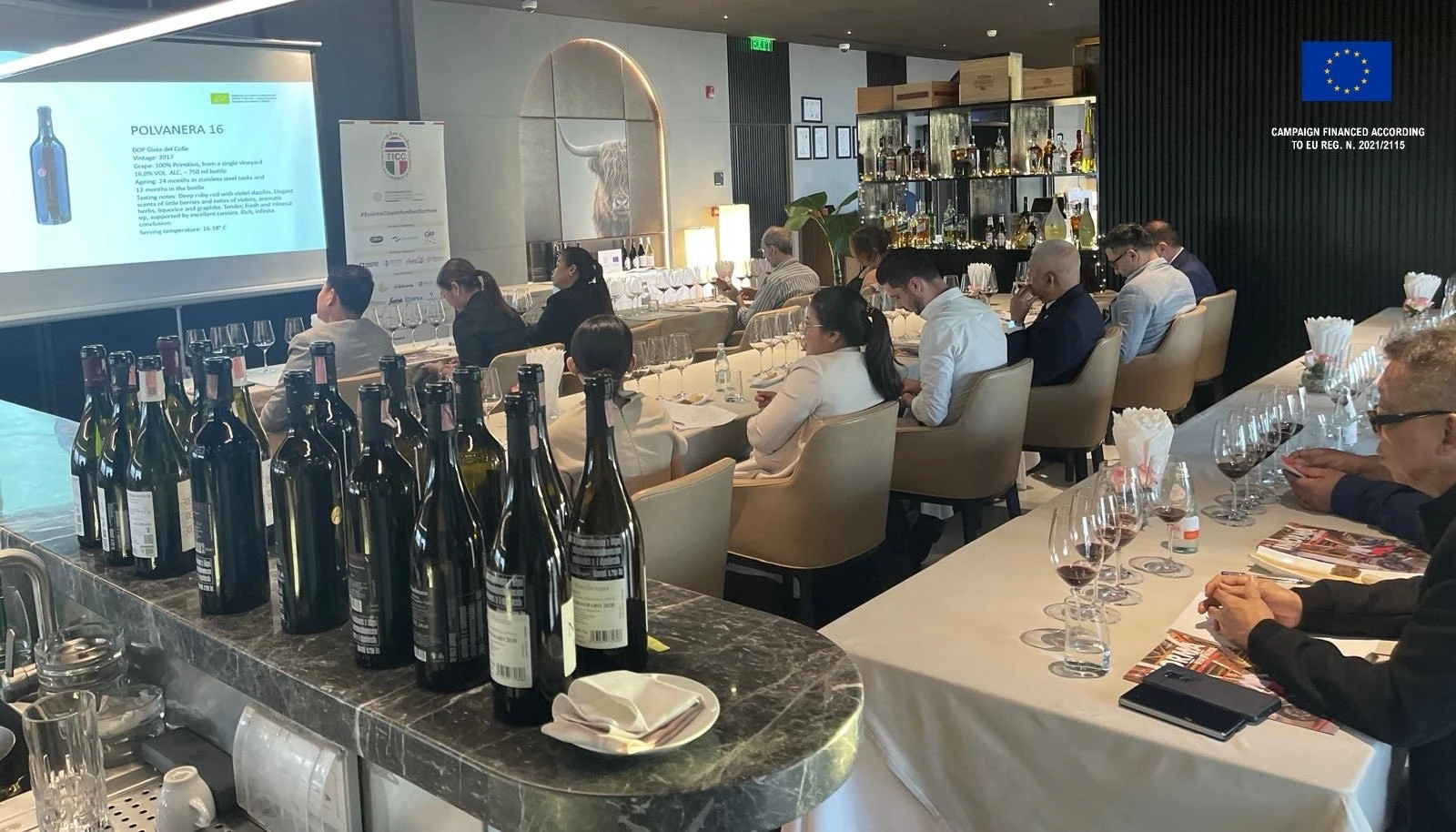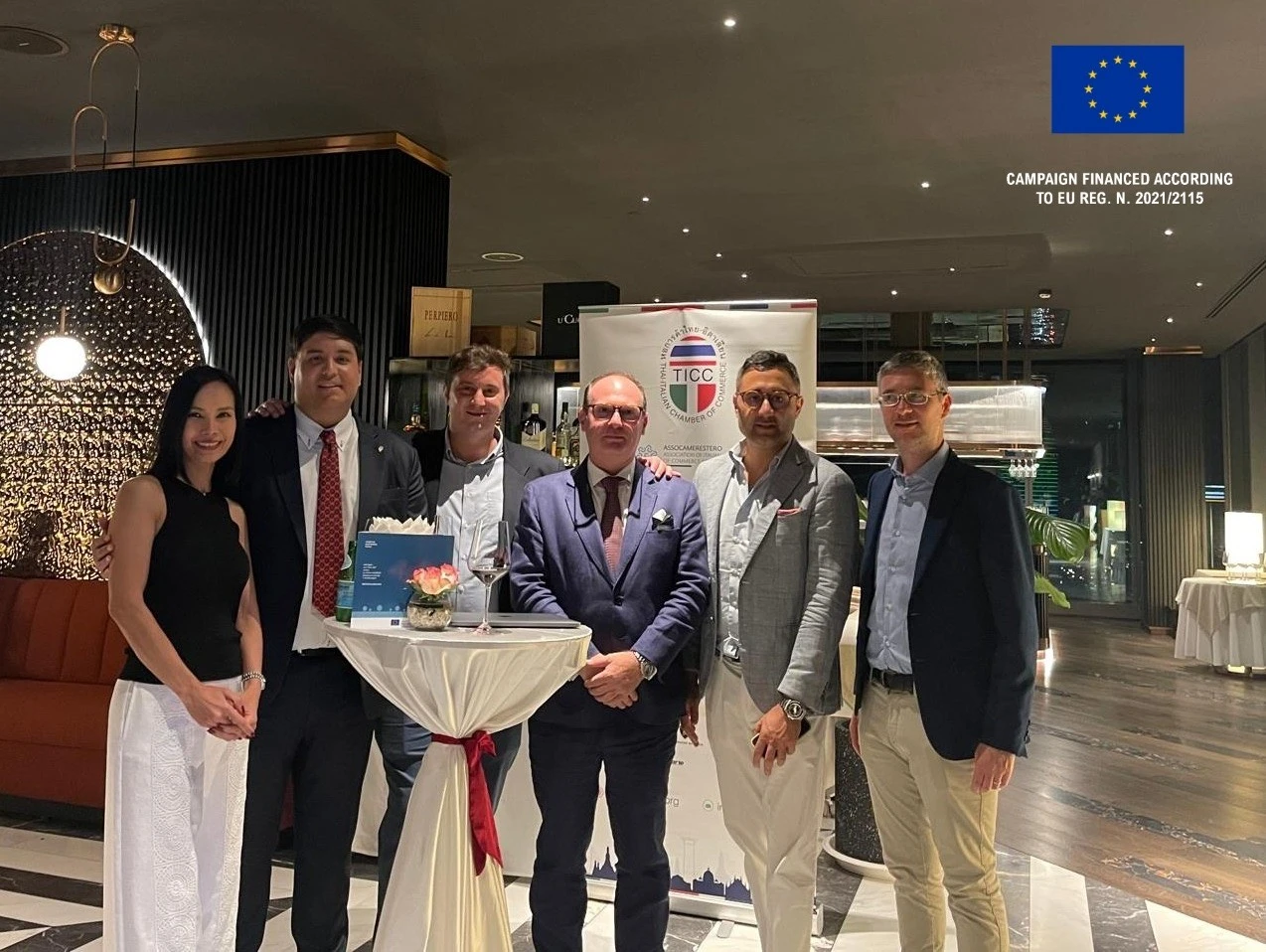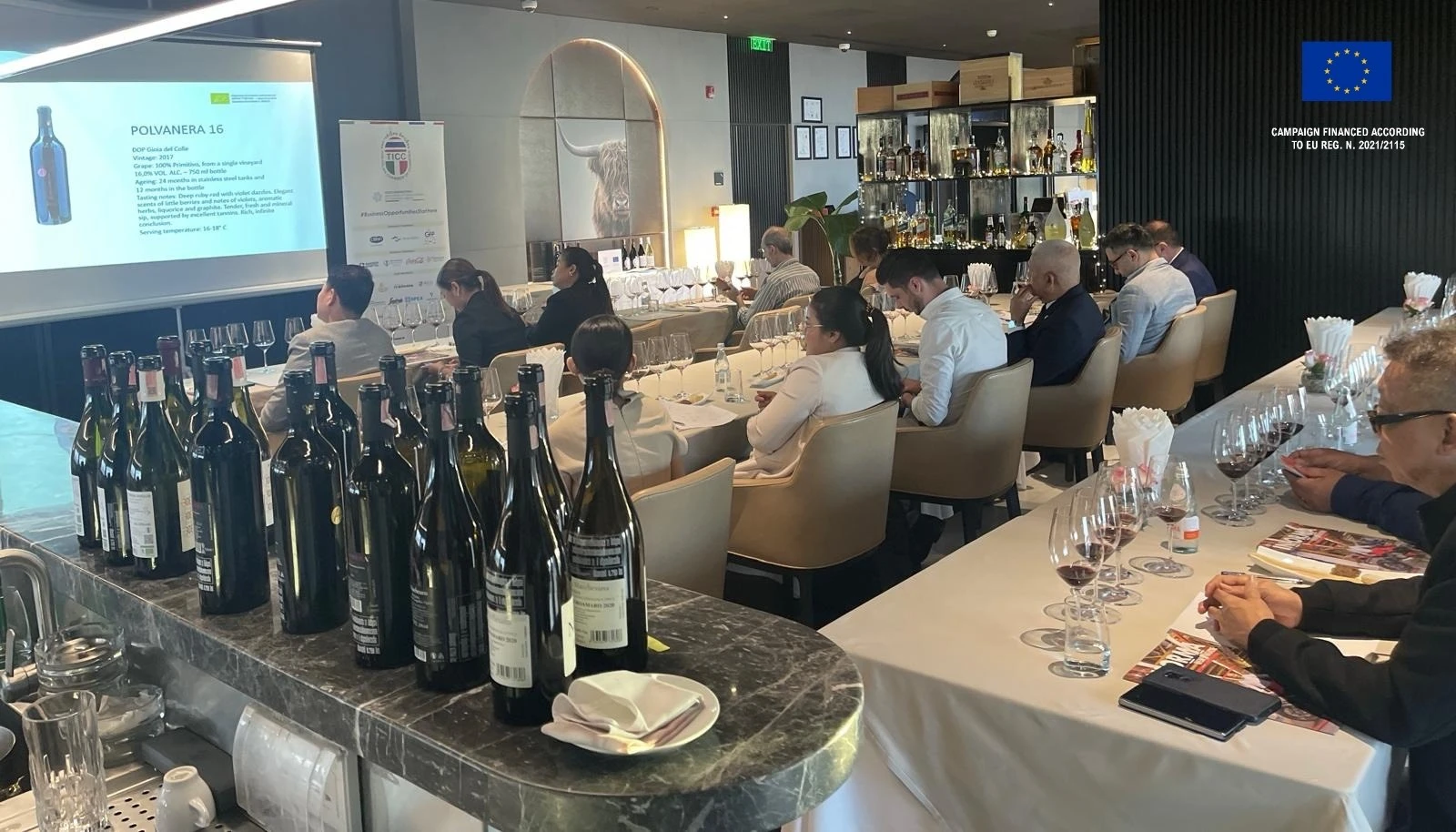-
Posts
36,858 -
Joined
-
Last visited
-
Days Won
5
Content Type
Events
Forums
Downloads
Quizzes
Gallery
Blogs
Everything posted by CharlieH
-

I bet this will surprise you ! - chatgpt users
CharlieH replied to CharlieH's topic in IT and Computers
I find it really useful and just like an assistant ad I don't need to repeat associated details. If I am tracking diet as an example, it knows what "breakfast" contains, it knows my exercise routine and so on. -

I bet this will surprise you ! - chatgpt users
CharlieH replied to CharlieH's topic in IT and Computers
-
Do you use Chatgpt on a regular basis? If you do, try asking it this ; "Based on our interactions, what do you know about me?" I'll bet you will be surprised ! I was amazed just how much detailed and accurate information it knew.
-
Many of us like using the likes of Lazada Shopee etc to huy stuff online. It's easier than trying to find it on the street and no communication issues for many.Its just convenient. But what exactly do you buy ? Please complete the Poll and let's see what's the most popular. If you don't mind, and choose "other" what was it for ?
-
Western attitude to Asian situation.Chess meets checkers, different rules of the game. Unless it's absolutely rancid etc and inedible, there is no complaint because " you don't like it" 😉
-

Tenuta Viglione Expands Its Reach Into South-East Asia
CharlieH posted a topic in International Food
Family-run Italian winery, Tenuta Viglione, located in the sun-soaked region of Puglia in Southern Italy, is expanding its presence in Cambodia, with a particular focus on Phnom Penh. Known for producing high-quality organic wines, the winery is making a strategic move to introduce its unique offerings to a market increasingly interested in authentic, terroir-driven wines. Established in 1937 by the grandfather of the current owner Giovanni Zullo, Tenuta Viglione spans 160 hectares in the heart of the Gioia del Colle PDO (Protected Denomination of Origin) on the Murge Karst plateau. With vineyards situated at an average altitude of 400 meters above sea level, the area’s unique terroir and climate contribute to the wines’ distinctive acidity and minerality. For over 35 years, Tenuta Viglione has embraced organic farming practices, producing vino biologico (organic wine) since 1987. The winery’s philosophy revolves around two pillars: respect for the environment and a deep connection to the native grape varieties of the Puglia region. Except for one, Tenuta Viglione only vinifies indigenous varieties, a choice rooted in their belief that the region's native grapes are best suited to the land. As Giovanni Zullo explains, "If nature didn’t intend for Pinot Noir or Cabernet Sauvignon to thrive here, there’s a reason." Puglia, while traditionally known for its agriculture and olive oil production, has been attracting international attention in recent years. Celebrities like David and Victoria Beckham, Madonna, and George Clooney frequent the region, while Hollywood A-listers Dame Helen Mirren and Meryl Streep both found home in the southern region. Most recently, Stanley Tucci spotlighted the area in his CNN/BBC series “Searching for Italy.” Despite the rising profile of the region, its wines remain relatively underappreciated globally, though they consistently impress even the most discerning wine experts. Among Tenuta Viglione’s most celebrated offerings are its Primitivo, Negroamaro, and Susumaniello wines, as well as lesser-known varieties like Verdeca and Nero di Troia. Verdeca is a fresh, mineral-driven white wine with citrus and peach notes, while Nero di Troia is a bold, ruby red wine with aromas of blackberry and cherry, offering elegant tannins and a rich flavor profile. As the winery continues its foray into South-East Asian Countries, it aims to introduce more consumers to its organic, terroir-driven wines that embody the essence of Puglia. For more information and to find local stockists, visit Tenuta Viglione’s website. -
Family-run Italian winery, Tenuta Viglione, located in the sun-soaked region of Puglia in Southern Italy, is expanding its presence in Cambodia, with a particular focus on Phnom Penh. Known for producing high-quality organic wines, the winery is making a strategic move to introduce its unique offerings to a market increasingly interested in authentic, terroir-driven wines. Established in 1937 by the grandfather of the current owner Giovanni Zullo, Tenuta Viglione spans 160 hectares in the heart of the Gioia del Colle PDO (Protected Denomination of Origin) on the Murge Karst plateau. With vineyards situated at an average altitude of 400 meters above sea level, the area’s unique terroir and climate contribute to the wines’ distinctive acidity and minerality. For over 35 years, Tenuta Viglione has embraced organic farming practices, producing vino biologico (organic wine) since 1987. The winery’s philosophy revolves around two pillars: respect for the environment and a deep connection to the native grape varieties of the Puglia region. Except for one, Tenuta Viglione only vinifies indigenous varieties, a choice rooted in their belief that the region's native grapes are best suited to the land. As Giovanni Zullo explains, "If nature didn’t intend for Pinot Noir or Cabernet Sauvignon to thrive here, there’s a reason." Puglia, while traditionally known for its agriculture and olive oil production, has been attracting international attention in recent years. Celebrities like David and Victoria Beckham, Madonna, and George Clooney frequent the region, while Hollywood A-listers Dame Helen Mirren and Meryl Streep both found home in the southern region. Most recently, Stanley Tucci spotlighted the area in his CNN/BBC series “Searching for Italy.” Despite the rising profile of the region, its wines remain relatively underappreciated globally, though they consistently impress even the most discerning wine experts. Among Tenuta Viglione’s most celebrated offerings are its Primitivo, Negroamaro, and Susumaniello wines, as well as lesser-known varieties like Verdeca and Nero di Troia. Verdeca is a fresh, mineral-driven white wine with citrus and peach notes, while Nero di Troia is a bold, ruby red wine with aromas of blackberry and cherry, offering elegant tannins and a rich flavor profile. As the winery continues its foray into South-East Asian Countries, it aims to introduce more consumers to its organic, terroir-driven wines that embody the essence of Puglia. For more information and to find local stockists, visit Tenuta Viglione’s website.
-
With rising flood waters, could be an invaluable feature in some areas of Thailand !
-

Any experience transporting a 6 pack of beer into Thailand?
CharlieH replied to Old Fool's topic in General Topics
CLOSED -
Thailand, with its stunning beaches, warm climate, and unique culture, has long been a haven for expats. From retirees stretching their pensions to digital nomads seeking an affordable tropical lifestyle, many people are drawn to this vibrant country. Yet, despite the allure of the Land of Smiles, it’s surprising how many expats seem to have little interest in embracing the very culture they’ve moved into. In conversations witnessed on this forum by fellow expats, I’ve noticed a pattern: a significant number haven’t bothered to learn even basic Thai. Worse still, some openly express disdain for aspects of Thai culture and people, often making comments about the local “attitude” or complaining about things they just don’t understand. And then, there's the food—a key part of any cultural experience—where some outright reject Thai cuisine in favor of imported Western options. This begs the obvious question: Why are you here? The Culture Disconnect One of the most puzzling aspects of this expat phenomenon is the disconnect with Thai culture. Learning the language is not just about communication; it’s a bridge to understanding and integrating into society. Yet many long-term expats in Thailand don’t take the time to pick up even basic Thai phrases. When asked why, the excuses range from “I don’t need it; everyone speaks English,” to “It’s just too hard to learn,” and a particularly common one: “I leave it to the wife.” This last reason is perhaps the most revealing. Many expats rely on their Thai partners to navigate the language and culture, effectively outsourcing a key part of their integration. But learning the language, even at a conversational level, is crucial to breaking down cultural barriers. It opens doors to genuine relationships with locals, provides deeper insights into customs and traditions, and ultimately enriches the experience of living abroad. Failing to make an effort can make you feel like a permanent outsider, even after years in the country. Disdain for the Locals Even more surprising is the number of expats who seem to have a negative view of Thai people. Complaints about the "attitude" of locals—whether it’s the perceived lack of urgency in business dealings or frustration with how things are done here—are common. This can be especially frustrating for someone who chose to live in a country known for its relaxed pace of life and cultural differences. Of course, no country is without its challenges, but approaching the locals with respect and understanding goes a long way. Cultural differences are inevitable, but isn’t that part of the adventure of living in a foreign country? Rejecting Thai Cuisine Thai food is globally celebrated, and many people travel to Thailand just to sample its incredible flavors. Yet, some expats turn their noses up at it, opting for Western food or international chains. While everyone has their preferences, avoiding local cuisine entirely suggests a lack of curiosity or desire to truly experience the country. Living in a country and not trying its food is like reading half a book—you’re missing out on a rich and essential part of the story. Thai cuisine is as varied as its regions, from spicy curries to refreshing salads and delicious street food. By avoiding it, expats deny themselves one of the simplest pleasures Thailand has to offer. So Why Are They Here? If not for the culture, the food, or the people, what is keeping these expats in Thailand? The answer often boils down to three things: the weather, affordability, and ease of access to companionship. The Weather: Thailand’s tropical climate is a major draw for people seeking to escape harsh winters. It’s warm year-round, and for many, that’s enough to make the trade-off for cultural discomfort worth it. Affordability: Thailand is an attractive destination for those on fixed incomes, especially retirees. The cost of living is relatively low, and a modest pension can stretch much further than in many Western countries. Companionship: Thailand is also well-known for its vibrant nightlife and the ease with which foreigners can meet local women. For some expats, this is a big part of their appeal in staying long-term, though it may not be something they openly admit. Is It Enough? For those expats living in Thailand primarily for these reasons, the question remains: is it enough? Without a deeper connection to the culture, the food, and the people, how fulfilling can life in a foreign country really be? It seems a shame to live in such a culturally rich and welcoming place while maintaining a bubble of isolation and indifference. Thailand has so much to offer beyond the weather and affordable living. For those willing to immerse themselves—by learning the language, embracing the food, and approaching locals with an open mind—the rewards are far greater. It’s about more than just existing in a place; it’s about truly living there. Expats who continue to reject the culture and people of Thailand may find themselves missing out on the true beauty of the country. The richness of the experience lies in the interactions, the new tastes, and the ability to grow beyond one’s comfort zone. So, to those expats who struggle to connect with the culture they’ve chosen to live in, maybe it’s time to ask, “Why are you really here?” If the answer is just the sun, cheap rent, and an easy life, you might be missing the point of living in a place like Thailand. Ultimately, its what works for you and makes you happy ! but the question remains "Why did you choose to be here in Thailand, beyond the woman you married ?
-

New Bangkok Rules Limit Street Vendors to Designated Zones
CharlieH replied to webfact's topic in Bangkok News
Sp, 24,000 a month is "poor"people? When the average working wage is around 15,000 and I think minimum wage is around 12,000 Seems like the government thinks the majority of the population are "poor " and that's no restriction at all then on who can sell food. Don't make sense as usual ! -
Puglia’s finest wines were presented at the astonishing Siena Italian Steakhouse, on June 1 in Phnom Penh, as a part of the Italian National Day celebrations taking place all over the world. An event like this was held in Cambodia for the first time, following the increasing success of Italian food and beverage products in the country. The event was targeted at F&B professionals operating in Cambodia and aimed to showcase authentic food and wine produced in Italy. Organized by the Thai-Italian Chamber of Commerce TICC, Cambodia’s Committee, and with the support of the Italian-Oriental Chamber of Commerce and the Italian Honorary Consulate in Phnom Penh, attendance outnumbered the available seats at the two wine masterclasses and the networking 'aperitivo' that followed. Starting from the success achieved, Polvanera has confirmed its presence in Cambodia for the upcoming years, also thanks to the agreement obtained with its new distributor for the country. New prestigious tasting events are planned in the coming months. Polvanera is a family business that is deeply rooted in tradition. Their winemaking process reflects their natural environment, with the exclusive use of native grape varieties serving as a prime example. Many of their wines use grapes from bush-trained vineyards, preserving the ancient art of winemaking and staying true to its origins. While tradition is important for the owner Filippo Cassano and his family, innovation is just as integral to the process. Polvanera stays up-to-date on modern techniques and it’s through a balance of convention and novelty that the business sustains itself. For example, the wine rests in stainless steel tanks and red wine is kept in a limestone cellar at a constant 13 degrees Celcius after being bottled. Polvanera’s formula seems to have proven successful. Their labels have won multiple awards. They’re sold in more than 30 countries worldwide. And their success rate hasn’t slowed down upon entering the SEA markets either. The rising demand for Polvanera wine is driving the introduction of this winery into the Cambodian market. Wine has been in Puglia for thousands of years and will stick around for a long time to come. Filippo, his family, and his staff are carrying the torch of traditional winemaking forward. Their inspiring blend of tradition and innovation keeps the flame of winemaking alive. It’s delightful to see Cambodia’s enthusiasm for its wine. The story of Puglian wine exemplifies a timeless journey of ancient roots and modern mastery, culminating in various types of wine that embody the essence of their terroir. Rooted in heritage yet propelled by creativity, Polvanera’s wines captivate the palate, igniting a promising future in Cambodia’s wine scene. This sentiment is reflected by winemaker Filippo Cassano, who sees the beauty of offering nothing short of quality. “We are a family-run company producing organic native Puglian wines only, and in very limited amounts. We can’t compete in quantity, only in quality, by offering wine that faithfully represents our production area and its winemaking traditions. Our vines literally pop up from the limestone, in a windy and dry landscape; we are located on hills not far from the sea where thermal excursions between night and day give the grapes signature scents and acidity. Wine fragrances are thus mineral and balanced. They’re different from others. That’s why we present them as they are, without blending or adding anything. You may like them or not, but at least they are distinguishable. The more we make consumers aware of this approach, the more competitive we’ll get”.
-
Puglia’s finest wines were presented at the astonishing Siena Italian Steakhouse, on June 1 in Phnom Penh, as a part of the Italian National Day celebrations taking place all over the world. An event like this was held in Cambodia for the first time, following the increasing success of Italian food and beverage products in the country. The event was targeted at F&B professionals operating in Cambodia and aimed to showcase authentic food and wine produced in Italy. Organized by the Thai-Italian Chamber of Commerce TICC, Cambodia’s Committee, and with the support of the Italian-Oriental Chamber of Commerce and the Italian Honorary Consulate in Phnom Penh, attendance outnumbered the available seats at the two wine masterclasses and the networking 'aperitivo' that followed. Starting from the success achieved, Polvanera has confirmed its presence in Cambodia for the upcoming years, also thanks to the agreement obtained with its new distributor for the country. New prestigious tasting events are planned in the coming months. Polvanera is a family business that is deeply rooted in tradition. Their winemaking process reflects their natural environment, with the exclusive use of native grape varieties serving as a prime example. Many of their wines use grapes from bush-trained vineyards, preserving the ancient art of winemaking and staying true to its origins. While tradition is important for the owner Filippo Cassano and his family, innovation is just as integral to the process. Polvanera stays up-to-date on modern techniques and it’s through a balance of convention and novelty that the business sustains itself. For example, the wine rests in stainless steel tanks and red wine is kept in a limestone cellar at a constant 13 degrees Celcius after being bottled. Polvanera’s formula seems to have proven successful. Their labels have won multiple awards. They’re sold in more than 30 countries worldwide. And their success rate hasn’t slowed down upon entering the SEA markets either. The rising demand for Polvanera wine is driving the introduction of this winery into the Cambodian market. Wine has been in Puglia for thousands of years and will stick around for a long time to come. Filippo, his family, and his staff are carrying the torch of traditional winemaking forward. Their inspiring blend of tradition and innovation keeps the flame of winemaking alive. It’s delightful to see Cambodia’s enthusiasm for its wine. The story of Puglian wine exemplifies a timeless journey of ancient roots and modern mastery, culminating in various types of wine that embody the essence of their terroir. Rooted in heritage yet propelled by creativity, Polvanera’s wines captivate the palate, igniting a promising future in Cambodia’s wine scene. This sentiment is reflected by winemaker Filippo Cassano, who sees the beauty of offering nothing short of quality. “We are a family-run company producing organic native Puglian wines only, and in very limited amounts. We can’t compete in quantity, only in quality, by offering wine that faithfully represents our production area and its winemaking traditions. Our vines literally pop up from the limestone, in a windy and dry landscape; we are located on hills not far from the sea where thermal excursions between night and day give the grapes signature scents and acidity. Wine fragrances are thus mineral and balanced. They’re different from others. That’s why we present them as they are, without blending or adding anything. You may like them or not, but at least they are distinguishable. The more we make consumers aware of this approach, the more competitive we’ll get”.
-
Less chance of damage or tampering.
-
Look on Facebook for interest groups or as suggested use their "marketplace" .
-
Why Aging Men Are Flocking to Thailand for Love – But the Price They Pay Could Cost Them Everything! The Allure of Affection: Why Ageing Men Seek Physical Intimacy Abroad and the Hidden Costs of Emotional Dependency In recent years, a noticeable trend has emerged of aging men leaving their home countries to seek affection and intimacy in places like Thailand. These men, often in their 50s, 60s, or beyond, find themselves drawn to the promise of younger, attractive women who offer attention—whether genuine or paid for. For many, this experience becomes like an emotional drug, offering a sense of validation, desire, and connection that may have been missing for years. However, this path, while seemingly fulfilling, can lead to emotional dependency and financial ruin. The Unfulfilled Affection at Home For many older men, the motivation to seek affection outside their home country begins with a sense of emotional deprivation in their current relationships. Long-term marriages often experience a decline in physical affection and intimacy as routine, stress, and ageing take their toll. In many cases, the affection that once was a key component of the relationship diminishes or vanishes, leaving men feeling unwanted, unappreciated, and emotionally isolated. This lack of affection is not just about physical touch but also emotional connection. A man who feels emotionally disconnected from his partner may begin to long for the validation and appreciation he once experienced or hoped to experience. As years go by, the longing for affection intensifies, and the allure of a place like Thailand—where affection and attention are more easily accessible—becomes stronger. Thailand: A Promised Land of Attention Thailand, with its reputation for hospitality, warmth, and exotic charm, offers an attractive escape. For aging men, the country represents not just a physical destination but an emotional haven. In Thailand, they often encounter younger women who are willing to offer affection, intimacy, and companionship, sometimes in exchange for financial support. This arrangement, whether based on transactional relationships or seemingly genuine connections, provides these men with what they have been missing—attention, validation, and physical intimacy. For men who have been starved of affection at home, this newfound attention can feel euphoric. Younger women who show interest, admiration, or even flirtation give these men a renewed sense of vitality. They feel desired, attractive, and important again—emotions they may not have felt in years. This experience can become addictive, akin to an emotional drug, as it offers immediate and intense gratification. The Emotional Drug and Its Effects For many men, the affection they find in Thailand becomes more than just a casual escape; it becomes an emotional lifeline. Affection and physical intimacy trigger the release of oxytocin, dopamine, and other "feel-good" hormones that create a sense of bonding and happiness. When someone has been deprived of these feelings for an extended period, the desire to hold onto them becomes overwhelming. However, the downside of this emotional high is the potential for emotional dependency. Men may begin to rely heavily on these relationships for their sense of worth, happiness, and self-esteem. They become attached to the affection, fearing that if they lose it, they will return to the emotional void they were escaping from. This dependency can lead them to prioritise these relationships above all else, making irrational decisions to maintain them at any cost. The Financial Pitfalls What often starts as an emotional need for affection can quickly spiral into a financial disaster. In Thailand, relationships between older men and younger women often come with financial obligations. Whether it's through direct payments for companionship or the expectation of supporting a partner's lifestyle, the financial commitment can escalate rapidly. Some men may find themselves spending large sums of money to maintain their relationships, unaware of the long-term consequences. They may buy gifts, provide living expenses, or even fund business ventures for their partners. Over time, these costs can add up, draining retirement savings, pensions, or personal wealth. Many men have found themselves in precarious financial situations, supporting relationships that are either fleeting or built on transactional terms. In some cases, these relationships are not based on genuine affection but rather the economic motivations of the women involved. While this does not negate the emotional fulfilment the men feel, it can lead to disappointment and financial ruin when the true nature of the relationship becomes clear. The Allure of Escape and the Unseen Costs The allure of Thailand, or other similar destinations, lies not only in the promise of affection but also in the sense of escape it offers. For many ageing men, travelling to a foreign country represents a break from the stresses and emotional voids of their lives at home. It is a chance to feel young, attractive, and valued once again. However, this escape often comes with unseen costs. The emotional and financial toll of maintaining these relationships can become overwhelming. Some men may cut ties with their families or friends back home, isolating themselves in pursuit of the emotional gratification they find abroad. This can lead to strained relationships, divorce, or complete social disconnection. The Inevitable Conclusion For many men who seek affection and intimacy abroad, the journey begins with emotional fulfilment but often ends in disappointment. As the emotional highs wear off and the financial strain mounts, reality sets in. Relationships based on transactions or significant age gaps may struggle to withstand the test of time. In the end, many men are left with diminished finances, broken relationships, and the realisation that the affection they sought was fleeting. The craving for affection and validation is deeply human, and for those who have been deprived of it, the allure of a place like Thailand can be irresistible. However, without careful consideration and self-awareness, what begins as an emotional escape can quickly turn into a downward spiral. Ageing men who seek affection abroad must be mindful of the potential emotional and financial consequences, understanding that the temporary gratification they find may come at a very steep cost.
- 162 replies
-
- 16
-

-

-

-

-

-

-
Totally agree, I posted about this sometime back, its quiet and very efficient. Highly recommended.
-
Clearly a tech issue guys and its being worked on. Your patience is appreciated.
-
Moving to Thailand with your family offers a thrilling new chapter filled with rich experiences. With its warm climate, dynamic culture, and welcoming people, Thailand is a top choice for expats. To ensure a smooth transition, check out these must-know tips for a successful move: Choosing the Best School: Secure a school for your kids in Thailand early due to high demand. International schools with Western curriculums are available. Master Basic Thai Phrases: Learning basic Thai enhances daily life and interactions, particularly in rural areas, showing respect for local culture. Visa Essentials for Your Family: Familiarize with Thailand's visa options. Begin collecting required paperwork early to prevent application delays. Prepare for the Heat: Thailand's hot, humid tropical climate features a June-October rainy season. Pack light clothes and sun protection to adapt to weather changes. Plan Your Healthcare Options: Thailand has a solid healthcare system with excellent private hospitals. However, costs can be high, so securing good health insurance is crucial. Look for comprehensive plans like the one Cigna offers that cover medical care both locally and abroad. Get your free quote now! 6. Find Kid-Friendly Housing: Find family-friendly neighborhoods in Bangkok, especially in Sukhumvit and Ari. Look for gated communities and condos with amenities like pools and playgrounds. 7. Set Up Local Banking: Opening a bank account in Thailand is easy. Just pick a bank with English services and bring your passport and visa. 8 Respect Local Customs: Respect elders and authority in Thai culture. Teach family about "wai" greeting and shoe removal to adapt to local life. 9. Navigate Local Transportation: Thailand has affordable transport options like the BTS Skytrain. Cars are more practical in rural areas for family travel. 10. Secure Comprehensive Insurance: Beyond health insurance, look into home and travel coverage to protect your family. Global insurance plans can also offer services like emergency evacuation and wellness programs. Why Opt for Cigna Health Insurance: Worldwide Network: Get access to a vast network of healthcare providers globally, ensuring top-notch care no matter where you are. Complete Coverage: From preventive care and specialist visits to emergency services, Cigna covers a wide range of medical needs. Tailored Plans: Flexible insurance plans that suit your lifestyle and budget, featuring perks like THB0 preventive care and virtual consultations. 24/7 Assistance: Enjoy around-the-clock customer service for any questions or support you need. Wellness Support: Stay healthy with programs designed to promote wellness and preventive care. Choosing Cigna Health Insurance guarantees your family's health and well-being while enjoying the adventure of living in Thailand. Global Cigna plans available: Silver plan Gold plan Platinum plan Annual Coverage Limit: 35,000,000 THB Comprehensive coverage including hospitalisation Cancer care Intensive care Annual Coverage Limit: 70,000,000 THB Enhanced coverage options Outpatient treatment Medical evacuation Annual Coverage Limit: 150,000,000 THB Extensive coverage with additional benefits Wellness programmes Direct billing to hospitals Get your free quote now! Summary of the original article by The Thaiger
-

Anyone noticed any changes in Lazada re searching local products?
CharlieH replied to Kenny202's topic in General Topics
The "filter" is still there (when I remember) but agree its damned annoying when you dont get told its China until AFTER the purchase in some cases. easiest way to check is click on "delivery." if states "sellers' own fleet" its usually China. Also the delivery times are usually in excess of 7 days. They also got sneaky showing Samut Prakan, but its NOT they are drop shippingfrom China -
Erectile dysfunction (ED) is a common issue that affects millions of men worldwide. While it can be distressing, it’s important to know that ED is often manageable with the right approach. In this article, we’ll dive into the causes, proven remedies, and suggested supplements to help men overcome ED and improve their sexual health. Plus, we’ll share a real-life story that shows how tackling ED is not only possible but can lead to a better quality of life. What is Erectile Dysfunction? Erectile dysfunction, or ED, is the inability to achieve or maintain an erection firm enough for sexual intercourse. While occasional difficulty with erections isn’t uncommon, ongoing ED can signal a health problem or emotional difficulty that needs addressing. Suggested Image: A simple diagram of the male reproductive system to help readers visualize how erections occur. Causes of Erectile Dysfunction ED can be caused by a range of factors, including physical, psychological, and lifestyle influences: 1. Physical Causes: Conditions like heart disease, diabetes, high blood pressure, obesity, and high cholesterol are often linked to ED. These issues affect blood flow, which is crucial for erections. 2. Psychological Causes: Stress, anxiety, depression, or relationship problems can lead to ED. Sometimes, even the fear of ED itself can make the problem worse. 3. Lifestyle Factors: Smoking, excessive alcohol consumption, poor diet, and lack of exercise can also contribute to ED. These habits affect circulation, energy levels, and overall health. 4. Medications and Hormonal Imbalances: Certain medications, like antidepressants or blood pressure drugs, may interfere with erectile function. Low testosterone levels (low T) can also reduce libido and cause ED. Proven Remedies for Erectile Dysfunction 1. Lifestyle Changes Making improvements to your lifestyle can have a significant impact on ED: Exercise: Regular physical activity improves blood flow, reduces stress, and boosts overall health. Healthy Diet: A balanced diet, rich in fruits, vegetables, whole grains, and lean proteins, supports cardiovascular health and may reduce ED symptoms. Quit Smoking and Limit Alcohol: Both smoking and excessive drinking can damage blood vessels and reduce blood flow to the penis, making ED more likely. 2. Counseling and Therapy If psychological issues like stress, anxiety, or depression are contributing to ED, therapy can help. Couples counseling may also be beneficial if relationship difficulties are involved. 3. Medications Several prescription medications are available for ED, such as sildenafil (Viagra), tadalafil (Cialis), and vardenafil (Levitra). These drugs work by increasing blood flow to the penis and are highly effective for many men. Suggested Supplements for ED While lifestyle changes and medications are the most effective treatments, some men turn to supplements to support sexual health. Here are a few that have shown promise: 1. L-Arginine An amino acid that helps the body produce nitric oxide, which relaxes blood vessels and improves blood flow. Some studies suggest it can help treat mild-to-moderate ED. 2. Panax Ginseng Often referred to as the "herbal Viagra," Panax Ginseng has been used in traditional medicine to improve erectile function and overall vitality. It may help boost energy, reduce stress, and enhance libido. 3. DHEA (Dehydroepiandrosterone) DHEA is a hormone that can be converted into testosterone and estrogen in the body. Some studies suggest it may help with ED, especially in men with low testosterone. 4. Ashwagandha This adaptogen is known for reducing stress and improving mood, both of which can positively impact erectile function when psychological factors are involved. 5. Zinc Zinc plays an essential role in testosterone production and overall male sexual health. Low levels of zinc have been linked to ED, so ensuring you get enough zinc may help improve symptoms. Important Note: Always consult a healthcare professional before starting any new supplement, especially if you’re taking other medications or have existing health conditions. Real-Life Story: How Tom Overcame ED Tom, a 52-year-old office worker, had been experiencing ED for over a year. He noticed it started when his job became more stressful, and he was drinking more alcohol in the evenings. His confidence took a hit, and his relationship with his partner began to suffer. “I felt like I was failing as a man,” Tom shared. “I tried to ignore it at first, but it just kept getting worse.” After consulting his doctor, Tom was diagnosed with mild hypertension and ED. His doctor recommended that he start by making some lifestyle changes. Tom quit smoking, reduced his alcohol intake, and began exercising regularly. After three months, he started taking sildenafil (Viagra), which greatly improved his ability to maintain an erection. “I didn’t think lifestyle changes would make such a difference, but they did,” Tom said. “Between that and the medication, I feel like I’ve regained control of my life and my relationship.” Conclusion Erectile dysfunction can be frustrating and embarrassing, but it’s important to remember that it’s a common issue with solutions. Whether it’s through lifestyle changes, counseling, medication, or supplements, there are many ways to improve sexual health and regain confidence. If you’re experiencing ED, know that it’s okay to seek help. By understanding the causes and exploring treatment options, you can take steps toward a healthier, more satisfying life. Common Questions About ED Is ED a normal part of aging? While ED is more common as men age, it’s not an inevitable part of getting older. Often, it’s related to other health issues that can be treated. Can lifestyle changes really improve ED? Yes, for many men, improving diet, exercising, and quitting smoking can significantly reduce or eliminate ED symptoms Are supplements for ED safe? Some supplements can be helpful, but it’s important to talk to a doctor before trying them, as they can interact with other medications or conditions. No man should feel alone in dealing with erectile dysfunction. With the right approach, most men can improve or resolve their symptoms and lead fulfilling, healthy lives. Whether you choose medication, therapy, lifestyle adjustments, or supplements, the key is to take action and open up the conversation.
.png.3b3332cc2256ad0edbc2fe9404feeef0.png.8488ab72b8bb2e508209bfe3211b6e08.png)



.webp.55df99f1fce6eadd812113e608e293a1.webp)
.webp.2a441484880d672cabd7ddc49cc87184.webp)
.webp.08acbcbd3789fa4641f3b15d71429970.webp)
.webp.c0155761cd3a52719a9412eba115dae7.webp)




